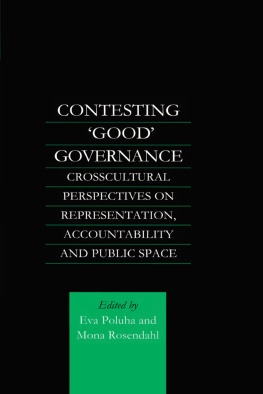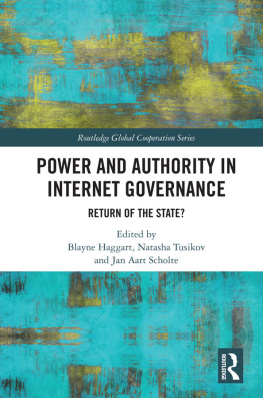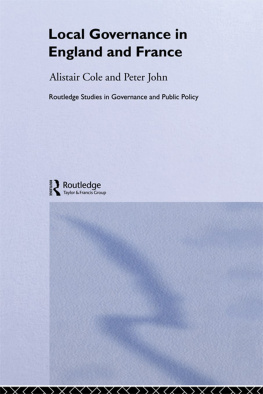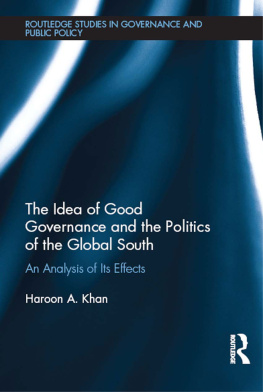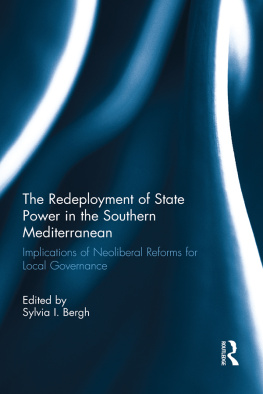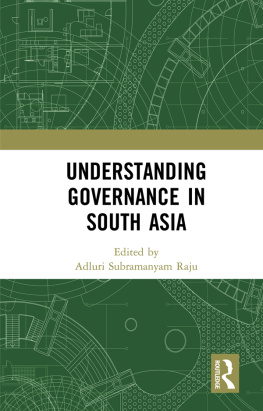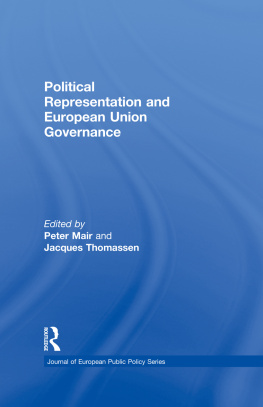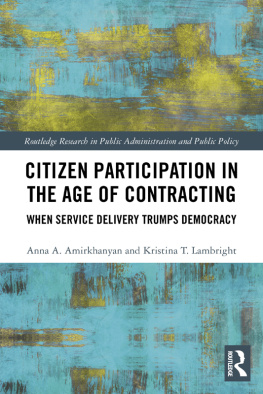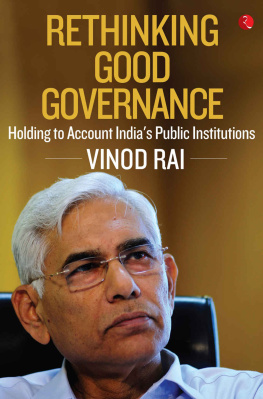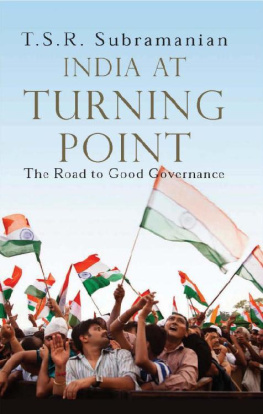CONTESTING
GOOD GOVERNANCE
CONTESTING
GOOD GOVERNANCE
CROSSCULTURAL PERSPECTIVES ON
REPRESENTATION, ACCOUNTABILITY
AND PUBLIC SPACE
Edited by
Eva Poluha and Mona Rosendahl
First published 2002
by Routledge
2 Park Square, Milton Park, Abingdon, Oxon OX14 4RN
Simultaneously published in the USA and Canada
by Routledge
711 Third Avenue, New York, NY 10017
Routledge is an imprint of the Taylor & Francis Group
2002 Eva Poluha and Mona Rosendahl
Typeset in Stempel Garamond by LaserScript Ltd, Mitcham, Surrey
All rights reserved. No part of this book may be reprinted or reproduced or utilised in any form or by any electronic, mechanical, or other means, now known or hereafter invented, including photocopying and recording, or in any information storage or retrieval system, without permission in writing from the publishers.
British Library Cataloguing in Publication Data
A catalogue record of this book is available from the British Library
Library of Congress Cataloguing in Publication Data
A catalogue record for this book has been requested
ISBN 0-7007-1494-4
Contents
1 Introduction: People, Power and Public Spaces
Eva Poluha and Mona Rosendahl
2 From Avoidance to Alliance: Hunter-Gatherers, Non-Governmental Organisations and State Relations in Tamil Nadu, South India
Christer Norstrom
3 Sounds of Silence: Uncertainty, Language and Politics in the Cuban Economic Crisis
Mona Rosendahl
4 Learning Political Behaviour: Peasant-State Relations in Ethiopia
Eva Poluha
5 In Touch with Politics: Three Individuals in the Midst of the Dalit Movement
Eva-Maria Hardtmann
6 The Republic of China at a Crossroads? Processes of Democracy and Ethnic Identity on the Island of Taiwan
Alexander Wanek
7 The Illicit Daughter: Hindi-Language Newspapers and the Regionalisation of the Public Sphere in India
Per Stahlberg
8 Public Space Inside Out: Beirut's Private and Public Spaces Under Reconstruction
Daniel Genberg
Acknowledgements
The present volume has been developed through a number of workshops in the beautiful surroundings of Stockholm and is an essentially collaborative work in which all the participants have contributed. Two close friends and colleagues, Annika Rabo and Eva Evers-Rosander accompanied us for a great part of the way, but due to other commitments they had to leave the project before it was finished. Their comments and ideas have, however, greatly influenced the various chapters as well as the volume as a whole. We are much indebted to them.
At a critical point in the writing process, Susan Wright appeared in Stockholm. She read and commented incisively and encouragingly on the individual papers, thereby helping us see that it would be possible to make a volume out of them after all. Although we were not able to carry out all Susan's suggestions, the volume was substantially improved thanks to her.
The comments of two anonymous reviewers have also helped considerably in shaping up the individual chapters as well as the introduction. Some of their observations concerned issues that we had happily succeeded in suppressing but were obliged to recognize once they were pointed out.
English not being our language of communication we have been greatly helped by the penetrating comments made by Margaret Cornell and Alan Crozier.
The programme benefitted greatly from the help of Lena Holm who kindly led us through what we experienced as a budget-maze.
Karin Norman kindly read and commented upon the Introduction. We wish to thank her for this.
SAREC, the Swedish Agency for Research Co-operation with Developing Countries, has sponsored our programme from the start, covering expenses for the workshops as well as some of the bibliographical, organisational and editorial work. Without this funding, the book would never have been published.
1
Introduction: People, Power and Public Spaces
Eva Poluha and Mona Rosendahl
PERCEIVING GLOBAL CONCEPTS THROUGH LOCAL PRACTICES
This book is about people's involvement in politics. The authors explore large-scale and complex political processes through the prism of detailed anthropological fieldwork. Research in specific localities in India, Cuba, Ethiopia, Taiwan and Lebanon is used to develop a broader understanding of global political phenomena, such as democracy, representation and accountability.
Governments, the United Nations and aid agencies often treat terms such as democracy, representation and accountability as if they can be used as yardsticks to measure the goodness of a particular government. This book questions these assumptions by asking how human beings from different walks of life relate to and reflect on large political issues and about the workings of the polity in which they find themselves.
In line with recent political anthropology which is contextualised in, and emphasizes, the experiences of people, such as hunter-gatherers, peasants, housewives or students, we want to show how essentially political their everyday activities are. As they are removed from the public institutions and arenas where power is exercised, confirmed and contested, not much importance has been attached to the political aspects of their activities. Here we want to show how various categories of actors in their daily work and interactions with relatives, friends, and officials, reflect on, talk about and engage with government plans, policies and legislation as well as with their own traditions. When discussing government interventions, people also evaluate them, and through their comments allow us to see many of their predilections for ideals such as those relating to good governance, like accountability, free speech, power-sharing and the rule of law. Their reflections also reveal that they see through government rhetoric and judge what is happening from their continuous observation of government practice. The experiences of the respective actors provide the basis for their individual strategies and for how they relate to more abstract ideas about good and bad governance. Their strategies do not necessarily have a clear-cut aim vis--vis their governments; rather they can be seen as part of everyday attempts at survival in often difficult circumstances. Developing their strategies, people show a great awareness of which policies may be pertinent to a specific situation, taking both explicit and implicit rules into consideration when coping. In most cases they seem to have developed their own strategies of adaptation in their dealings with government officials, trying not to incur too many losses, but if possible some gains. Sometimes, individuals also co-ordinate their activities in order to change the situation to their own advantage.
Not surprisingly, all the governments in our case studies see themselves, in the way they rule their respective countries, as advocates of one or several of the characteristics of good governance. Good governance, however, has somewhat different connotations in different contexts. In international discourse good governance comprises aspects such as transparency, accountability, free and fair elections and the rule of law. In the discourses, these aspects are endowed with some kind of absolute, either you have it or you don't value, to which every government has to relate. In several of the chapters, the comments made by various citizens on their own experiences with government politics reflect another, more critical perspective of the official rhetoric and discourse, somewhat removed from the good governance aura in which governments like to present themselves.

